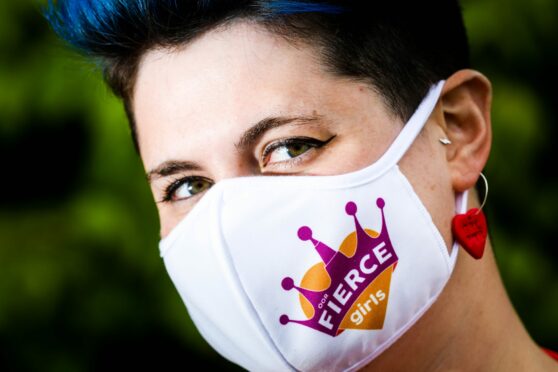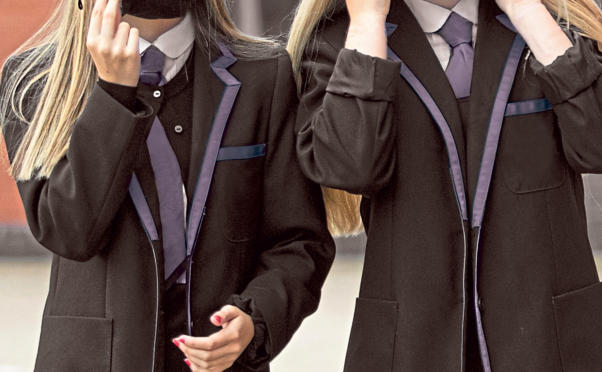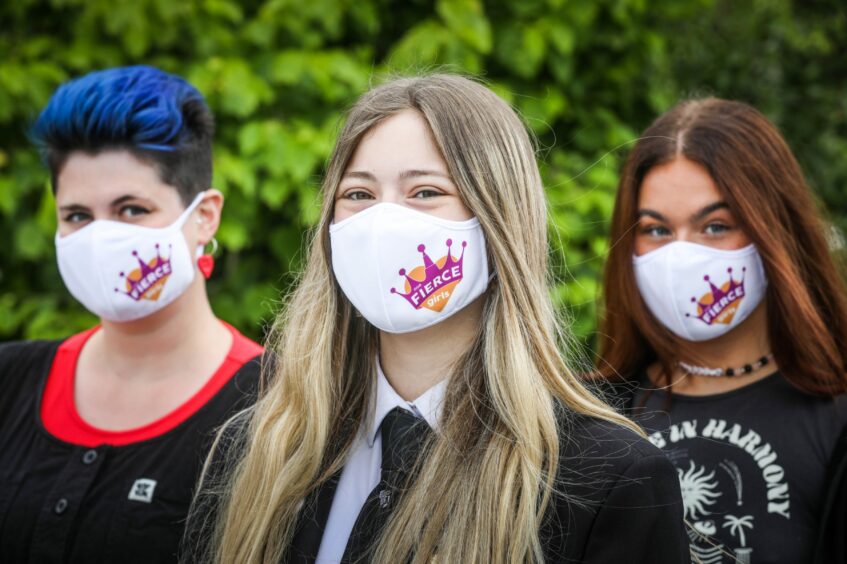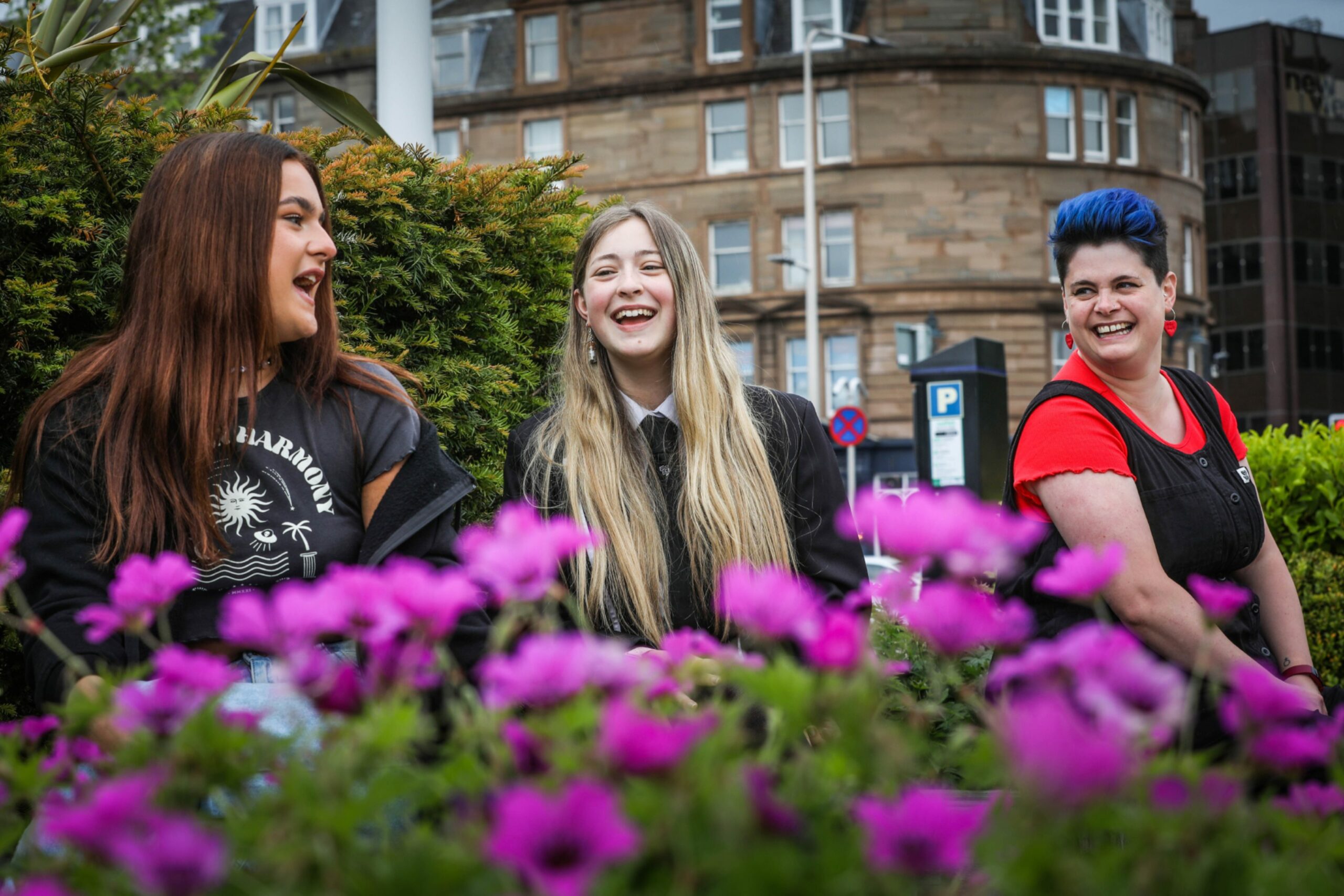
Emergency action is needed in class and online to combat the crisis of consent in Scotland’s schools, experts warn.
A range of specialists said a practical response of urgency and impact was crucial after a survey exposed the appalling scale of sexual harassment and assault facing teenage girls in Scotland where one in five said they had been sexually assaulted.
They backed the Respect campaign launched by The Sunday Post today calling for effective classroom initiatives to help teens understand healthy relationships along with tighter restrictions on online pornography, blamed for warping children’s attitudes to sex.
Our poll last week revealed three out of five girls under 18 had endured some sort of harassment, three out of five do not believe the extent of the crisis is understood, and four out of five do not believe enough is being done to curb verbal, physical and online harassment.
First Minister Nicola Sturgeon said fundamental change was needed to change the corrosive attitudes underpinning the abuse and harassment. She said she would consider any effective measures, adding: “While attitudes have changed, and changed for the better, no one should be under any illusions about the extent to which this is still a very real and current issue.
“Fundamentally, we need to tackle and challenge the attitudes that underpin violence against women and girls and ultimately prevent it from taking place. And I am open to anything that might help us to make a more significant, fundamental step change.”
However, while campaigners and politicians welcomed the first minister’s recognition that change was needed, they said far more than words and promises was demanded.
They said a classroom programme capable of teaching girls and boys about healthy, respectful relationships must be built and rolled out across Scotland’s schools as a matter of urgency while pressure must be put on the UK Government to restart moves to restrict access to online pornography, blamed for warping children’s attitudes to sex.
Scotland’s Children and Young People’s Commissioner, Bruce Adamson, was among those calling for action.
Writing in The Sunday Post today, he said: “The ongoing prevalence of sexual harassment and bullying must be addressed. Children have the right to be protected both online and offline.”
Lib Dem education spokesperson Beatrice Wishart, who raised the crisis of consent at Holyrood last week, called for a special commission to investigate violence against girls and young women and draft an action plan. She said: “We have been having these conversations for decades and we always end up at square one with women looking over their shoulder.
“We need better solutions than women being endlessly told to change their behaviour or their wardrobe. An important strand, however, has to be how we raise the next generation.”
WATCH: @BeatriceWishart calls again for a Commission on violence against women and girls during #fmqs pic.twitter.com/kulKm2oKAO
— Scottish Lib Dems (@scotlibdems) December 16, 2021
She said pilot lessons on relationships and sex being trialled in some schools should be examined and tested to help draft the most effective lesson for introduction to the curriculum for all Scots pupils.
She said: “We need to see new training for those working in education and frontline in public authorities. It’s shocking that the present Equally Safe at School toolkit is only in place in a tiny number of schools. Scotland is generally a good place to live, yet we are seeing domestic abuse rising, rape convictions woefully low and two-thirds of women not feeling safe on our streets, with three in five experiencing street harassment. That needs to change.”
Children’s charity Barnardo’s Scotland has recently been working with schools in two council areas to educate pupils about appropriate relationships.
Director Martin Crewe said: “Age-appropriate lessons on health, relationships and sex are vital to support children to stay safe and healthy, and to be able to prepare for challenges both on and offline. From our specialist child sexual abuse services, we know how important it is to teach children and young people about consent, healthy relationships, respect and how to ask for help. Lessons about online safety are also vital – while the internet offers incredible opportunities to learn and play, it also carries risks from cyber bullying to online grooming.
“In recent months, we have been working with schools in Glasgow and Renfrewshire to discuss peer-on-peer relationships and raise pupils’ awareness about healthy, consensual and respectful relationships.
“We also work as part of an expert group with the Scottish Government, Police Scotland, Stop It Now! Scotland and other partners, to progress and support delivery of the group’s proposals around preventing sexual offending involving children and young people.”
Sandra Brown, of the Moira Anderson Foundation, whose work includes counselling for girls affected by sexual abuse, said: “I wholeheartedly back The Sunday Post’s Respect campaign and urge the government to act.
“We cannot simply ignore what is happening. This crisis of sexualised violence towards girls and young women will not go away on its own. The only way we can tackle it is by teaching children respect, for themselves and for each other.”
Brown, who was made OBE in 2006 for services to child protection, added: “We need to educate our children so they know how to reach out and tell trusted adults when something is happening to them which makes them feel uncomfortable or vulnerable.”
Campaigner Ann Moulds, of Action Against Stalking, also backed our Respect campaign and said: “Respect has to be at the heart of everything we do to teach and support our children to keep them safe.
“We need to see much improved education in schools, and better training and resources for teachers so they feel confident teaching the dangers of easily accessible online adult material which so many children are copying.
“And we need far more robust ways of teaching those who abuse that their behaviour is wrong and won’t be tolerated. It’s the only way to prevent them becoming adult abusers. If we don’t teach them right from wrong, how will they ever learn the difference?”
Our poll showed that children themselves want more to be done, with almost 70% of girls and young women interviewed saying they do not believe the scale of the crisis is understood. Nearly 80% say more must be done to curb harassment.
The Sunday Post view: Our girls do not need warm words. They need respect and urgent action
Labour’s Shadow Minister for Children and Education, Martin Whitfield, a former teacher, said: “It is clear the time for talking about the growing incidents of sexualised violence against girls and young women is long gone. This is now so serious, we need action and it needs to be now, not in a year or two years’ time.
“We need to see programmes like Equally Safe At School rolled out across Scotland as a matter of urgency. After all the years of talking that have gone on about this issue, it is baffling why Scotland only has 31 schools using this programme.
“Health and wellbeing is already part of the curriculum for excellence. But what the Sunday Post research proves is that we need to go much, much further and ensure our young people are taught properly about issues such as consent and respect.
“We need robust programmes of education and support being made available and taught in every single school if we are ever going to stand a chance of ending the cycle of abuse and violence that blights our communities and affects the lives of so many families.
“We have a responsibility to teach our children to recognise healthy, loving relationships, and support them to be able to speak up and recognise when certain behaviour is unacceptable.
“That must also mean teachers are given the time and resources to teach them that. We need to up the ante on this.”
It started with verbal abuse from the same two boys
Girls and young women must help shape the emergency action needed to ease the crisis of consent in Scotland’s schools, according to one influential campaigner.
Elena Soper is one of the team behind Oor Fierce Girls, launched by teenage girls in Dundee last year to promote respectful, healthy relationships and challenge harassment.
Now 30, Soper suffered physical, psychological and sexual bullying before she was a teenager that led her to self-harm, and is one of the people who helped to develop the project.
She said: “It’s the schoolgirls themselves who decided what they needed and wanted. It’s been a huge success.
“If I’d had a group like Oor Fierce Girls to turn to when I was being bullied and abused and school, I doubt I would have ended up self-harming or ended up having to take antidepressants.”
She said: “It started with verbal abuse from the same two boys.
“It was nasty name-calling, attacking my appearance. But it escalated into physical abuse, pulling my bra strap, pulling my hair or putting their hands under me as I was about to sit down.
“I was always a bit of a nerd so I was different, and I dressed differently. I tried to brush it off and handle it myself but that’s difficult.
“When I was in fourth year things took a far more violent turn. The two same bullies were pushing people around in the school corridor and I’d just had enough and I refused to move.
“They attacked me, punched and kicked me. The violence was awful but luckily I didn’t have any broken bones and, of course, the teachers became aware of what was happening.”
The two boys were suspended from school for several days and Soper received counselling and medication.
“I was aware I wasn’t the only one being bullied and harassed at school, but it’s such an isolating thing to experience. All I really knew was it was happening to others.
“That’s why the Oor Fierce Girls project is so important and effective. If I’d had that kind of support things would have been different for me.”
Soper hopes similar groups can now be established across Scotland, encouraging young girls to support each other and help them recognise what is and what isn’t a healthy relationship.
The project is supported by Dundee City Council, the Young Women’s Movement, and children’s charity the NSPCC. Roisin Smith, of the council’s children and family services, said: “This has been an incredibly positive project, not least because so much of the work has been led by the girls themselves. Every school across the country has experienced bullying and behaviour issues, and these are dealt with by robust anti-bullying programmes.
“Not only are these young girls empowered, the positive effect has rippled out so it affects the boys as well as the whole community.”
We all need to do more to protect our children
By Scotland’s Children and Young People’s Commissioner, Bruce Adamson
The ongoing prevalence of sexual harassment and bullying must be addressed.
Children have the right to be protected both online and offline.
Over recent years, we have worked with European and international colleagues to ensure governments understand their obligations to keep children safe in the digital environment.
Online platforms themselves need to do much more to ensure children are safe online. Most have not been designed with children’s rights in mind and they are not doing enough to ensure children don’t get access to pornography and other harmful material.
Families play an important role and children have highlighted the value of parents having open and age-appropriate conversations with them about using digital devices and what they may experience online.
The government should do more to ensure that parents have the information and support they need to have those conversations.
It’s important to focus on empowering children to understand their rights in digital spaces. That includes increasing their understanding of what constitutes harmful behaviour so they can spot things which are concerning, so they know what to do, and so they know where to get support.
Children have been calling for a better balance between protection from harm and nurturing the opportunities offered by having access to the online world.
Such access can support their rights to education, to culture, to access information, and to recreation.
For many children, their online and offline worlds are inseparable.
Children want to have a say in actions and decisions that affect them in the digital environment, and they want to be involved in designing safer spaces.
Calls for age restrictions online
Child protection groups fear proposed legislation intended to limit the harmful effects of the internet does not go far enough in protecting children and young people from harassment, bullying and pornography.
They are calling on the UK Government to strengthen measures in the proposed Online Safety Bill, covering websites and apps that offer user-generated content such as Facebook, Instagram, Twitter, TikTok and YouTube, as well as search engines like Google.
The legislation will impose a duty of care on these companies to protect users from harmful content, or face fines levied by Ofcom, the communications regulator.
The bill is being scrutinised by a Westminster joint committee, comprising MPs and Lords. However, John Nicholson, the only Scottish MP on the committee, said action to introduce and rigorously regulate age limits on pornography sites was long overdue.
“The UK Government chose not to enforce age verification checks for pornography websites – something it had promised to introduce,” said Nicholson.
“We have urged an explicit duty for all pornography sites to ensure that children cannot access them. There should be punishing financial penalties for those who do not comply.
“Age verification checks would, experts believe, prevent the vast majority of young people who currently access porn sites from doing so. The onus would be on those sites to introduce stringent checks on those trying to gain access. Sites which fail to verify
age should be subject to severe financial penalties.”
Nicholson said self-regulation by social media companies did not work. He added: “Social media companies are often hopelessly slow in taking down harmful and violent content.
“That is why I believe that the time for self-regulation by social media companies must now be at an end. They are not ‘platforms’ as they try to claim. They are publishers and must be made to behave responsibly.
“They must be subject to criminal sanctions and financial penalties when they do not. They should be made liable when they publish hateful or violent content. Behaviour that is criminal offline must be criminal online.”
The draft legislation has been criticised by campaigners, however, for leaving too many loopholes on a range of issues from preventing children accessing pornography to anonymous abuse.
The National Society for the Prevention of Cruelty to Children (NSPCC) and other child protection groups claim that encrypted private messaging services represent the “frontline of child abuse”.
They are demanding social media companies and internet firms be made to risk-assess end-to-end encryption plans prior to their implementation.
Andy Burrows, NSPCC head of child safety online policy, said: “Every day, children face the harmful impact of being exposed to violent, bullying and sexual content online, despite such material breaching the community guidelines of most social media sites.
“For too long, platforms like Snapchat and others have not prioritised their duty of care to young users and have failed to invest in proactively identifying harmful content and removing it as quickly as possible. That is why the Online Safety Bill needs to deliver effective, systemic regulation that tackles how children are exposed to harmful content.”
The Reward Foundation campaigns for tough age restrictions to be placed on adult online sites, and CEO Mary Sharpe says it is deeply disappointed the current bill does not go as far as it should.

Enjoy the convenience of having The Sunday Post delivered as a digital ePaper straight to your smartphone, tablet or computer.
Subscribe for only £5.49 a month and enjoy all the benefits of the printed paper as a digital replica.
Subscribe


 © Mhairi Edwards
© Mhairi Edwards © Mhairi Edwards
© Mhairi Edwards